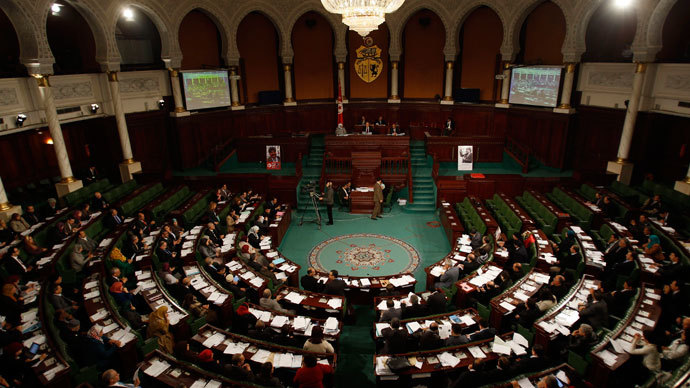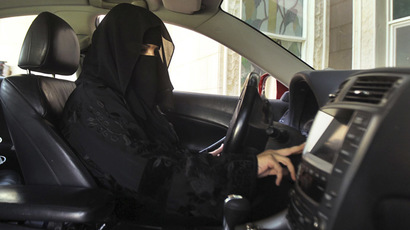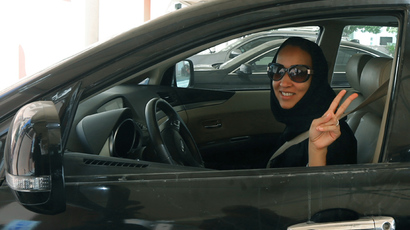Tunisia opts for civil, not Sharia law as assembly votes on new constitution

Tunisia has rejected Islam as the source of its laws, with the country’s Islamist-dominated constituent assembly voting to adopt new articles amid fears that ongoing disagreements may derail the constitution altogether.
The country that in 2011 gave birth to the Arab Spring has adopted new articles in its upcoming constitution, the first two of which state that Tunisia is a “civil” republic based on the rule of law, but with Islam remaining as its state religion. After Saturday’s vote, 12 of the 146 articles discussed have now been adopted.
The articles received harsh criticism from opponents, some of them believing that an absence of Islam from the legal framework would open the door to “Satanism and idolatry.” In fact, the assembly, which was set up in 2011 to establish a new constitution after the uprising that removed the then-president, Zine el-Abdine Ben Ali, was plagued by so much infighting that there are fears that the January 14 deadline for ratifying the new constitution would not be met, AFP reported.
Although a secular country during the former president’s rule, months of violent political unrest and assassinations opened the door for new ideas on how the country should be run. But Saturday’s vote put that on hold, retaining Islam’s position only as a moral – not legal – authority.
While Islam will remain the state religion, the government, under one of the newly accepted laws – Article 6 – will become “the guardian of religion,”“protector of the sacred” and shall guarantee “freedom of conscience,” something that has been hotly debated even by the law’s proponents, for fear of misinterpretation by those in power.
Saturday’s vote also rejected two amendments under which the Koran and Sunna – the acts, sayings and judgments of the Prophet Mohammed – as well as Islam itself, were to have legal power.
By implication, mosques would no longer be associated with, or used for, political activity.

The assembly was set to convene again Sunday to proceed with other articles. The new constitution will need to receive more than 140 votes, which is two-thirds of the 217-member assembly. If not, it will be put to a referendum.
Tunisian politicians hold very differing points of view on Islam’s place in law and civil society.
Human rights activists have welcomed the votes, seeing that religious courts with serious consequences for the individual have been prevented; while those advocating freedom within an Islamic framework argued that even with Islam as the source of law, people would have nothing to fear for their freedoms, because Islam would give its “spiritual backing” and support them. One such belief comes from a party calling itself the “Current of Love.”
But backers of Islam were unrelenting in their view that under the new law, virtually any other belief known to man could flourish.
Other, more secular politicians, like Mahmud Barudi of the Democratic Alliance, believe that adopting amendments under which Islam and its religious texts are law was equal to living in the past.
To counter the proponents of the view that a lack of Islam in the legal framework would allow “Satanism” to thrive, the ruling Ennahda party’s Sonia Ben Toumia said that “Islam is a religion that guarantees freedom of religious practice to others.”
One problem encountered with the new constitution has to do with the allegedly vague wording of the articles already adopted. Some fear the new laws are too open to interpretation – especially the part about the state being the guarantor of all things sacred. Activists from the Tunisian League of Human Rights believe this could threaten civil freedoms.
Deep divisions continue to mar the rebuilding of the Tunisian political system. Friday’s session had to be halted because speakers would not sit calmly.

The Ennahda party and the opposition continue to be divided amid a spark in Islamist attacks and civil unrest, putting in danger the work of the assembly, which was meant to adopt a new constitution within a year. It has now been nearly three years since the uprising against Ben Ali.
One notable delay occurred with last July’s assassination by Islamists of a prominent political opposition leader. Political assassinations are not uncommon in the country since the start of the Arab Spring.
Although the ruling Ennahda party agreed to step down in October in accordance with the strategy proposed by political mediators – and amid accusations that it was not effective in bringing jihadists to justice – former Prime Minister Ali Larayedth believes a new constitution and an electoral law must be in place to ensure safe elections in 2014.














